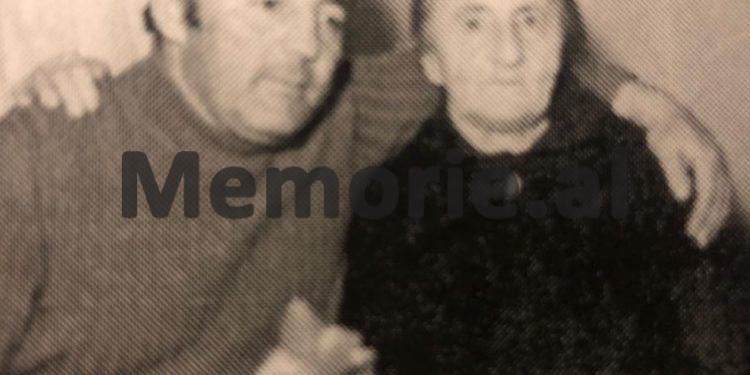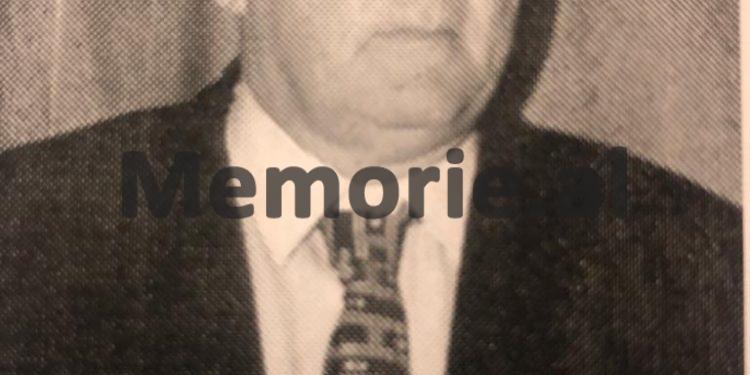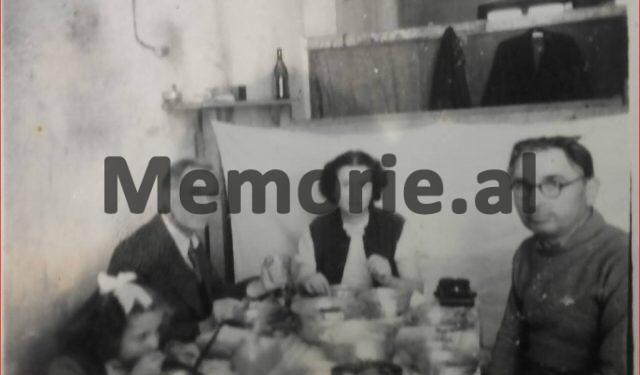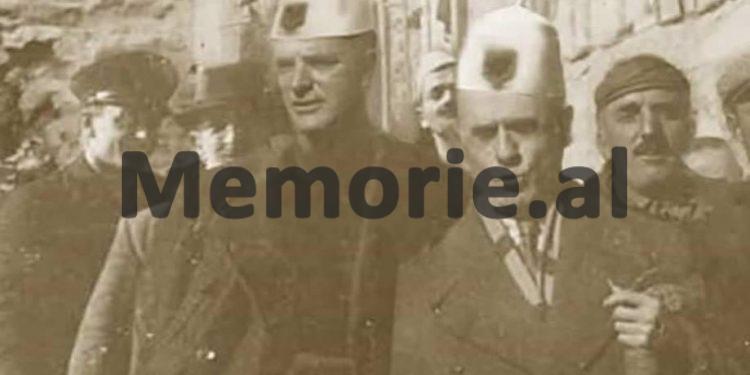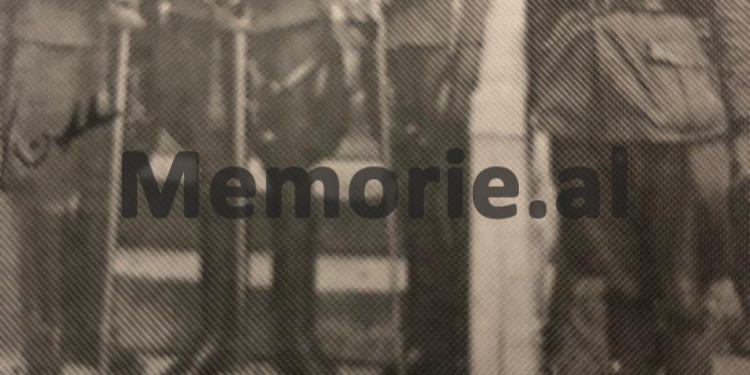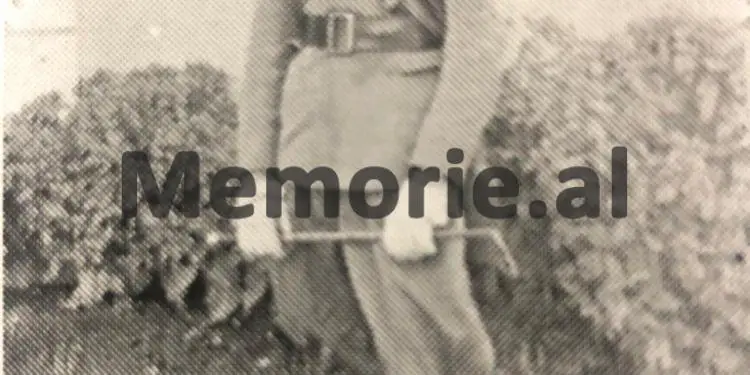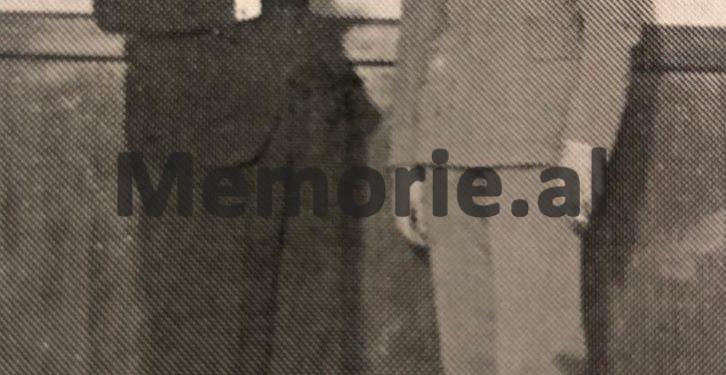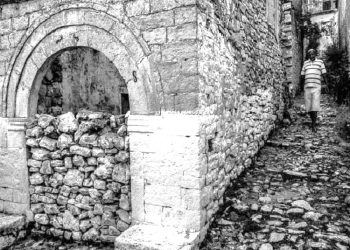Dashnor Kaloçi
Memorie.al publishes the unknown story of Rapo Biner, originally from the village of Fushë-Bardhë in Gjirokastra, who after graduating from the Zog Monarchy at the Military Academy of Florence and Bologna, returned home and served as a career soldier in several districts of the country with the rank of captain and during the period of occupation of the country, he did not interfere at all in politics, but helped the partisans of Myslym Peza, installing heavy artillery, and in November ’44, left Albania with some of the main exponents of Balli and Legality, such as Mit’hat Frashëri, Hasan Dosti, Faik Quku, Neshat Kolonja, Masar Pustina, Xhemal Laçi, Hamza Drini, Halit Çaushi, etc. The testimony of his son, Veli Bineri, regarding the inhuman treatment of their family by the communist regime, initially confiscating their house on Durrës Street and interning them in Delvinë, where they put them in a cattle hut and the mother of He was sentenced to two months in prison, which he suffered in Gjirokastra Castle, where he was loaded with bags of salt and on the way, some communist families in the “Papuçi” neighborhood insulted and insulted him. Along with the mother was a neighbor of ours, Ervehe Hadëri, who had been shot by the communists, and from this attitude towards her, she lost her son, Feletuni, while her daughter, Engjëllushja, became depressed.
“As my mother told me, in January 1945, when my father had not escaped from Albania for more than two or three months, some partisans of the Defense Division Forces came to our house on Rruga e Durrësit and after entering with a great noise, they began to search the house. From their arrival, that way, the mother and two younger sisters were horrified, and I was no more than a year old at the time. The six partisans and the officer who commanded them, after returning all the clothes of the house, took with them all the personal belongings of the father, collecting them in some suitcases which he had brought from Italy since 1931 when he was at the Academy. of Florence. Before leaving, the partisans took with them a wooden plank that the father used barefoot in military boots, and when his mother told him what they wanted, they replied, “We know.” The man who speaks and testifies for Memorie.al is Veli Bineri, who recounts all the sufferings and vicissitudes he and his family went through during the communist regime of Enver Hoxha, for the sole reason that his father Rapo Bineri, a former career officer at the Zog Monarchy who graduated from the Florence Military Academy, escaped from Albania in November 1944, along with the main exponents of Balli and Legality. But who was Rrapo Bineri and what is his past? Where did he serve after graduating from the Florence Military Academy, and why did he go to Peza in 1944 to help Myslym Peza’s partisans install artillery that would be used against the Germans? Why did Rrapo Bineri escape from Albania and what was the attitude of the communist regime towards his family?
Who was Rrapo Bineri?
Rrapo Bineri was born on January 24, 1908, in the village of Fushë-Bardhë in Gjirokastra, where his family originated from. Regarding the past of his father Rrapos, his only son, Veli Bineri, testifies: “Rrapo’s father and grandfather were called Zeman and in those years he was involved in a small business to support his family. In addition to this work, my grandfather Zemani has long served as an adjutant of Myfit Bey Libohova, who at that time was one of the most famous beys of Libohova and several times a member of the Albanian Parliament. Since my father Rrapo was the only son, grandfather Zemani took great care of him and sent him to continue the French Lyceum of Gjirokastra, where the father came out with very good results and after closing that school, he went to Korça. where he graduated from the French Lyceum of that city in 1926. For this purpose, he was awarded a state scholarship by the government of that time to pursue studies at one of the military schools of Italy, which was made possible by an agreement that was made at that time between the Italian and Albanian governments, for the education of many Albanian students in the Military Academies of Italy “, recalls Veli Bineri, regarding his father Rrapon, from the village of Fushë-Bardhë in Gjirokastra, who after being educated in The French Lyceum of Korça, won the right to study in the Military Schools of Italy.
At the Academy of Florence
After the Albanian government awarded the scholarship to pursue military studies in Italy, in September 1928, Rrapo Bineri together with some of his friends, such as Sulejman Vuçiterna from Kosovo, Syrja Golja from Peshkopia and Riza Hasan Hoxha from the village of Sanjollas in Kolonjë, traveled to Italy. Regarding this, Veli Bineri testifies: “As my mother Nezaqeti told me, my father Rrapo studied in two military schools, in Bologna, where he graduated with honors and won the right to continue the Military Academy in the city of Florence. In this two-year Academy, which at that time was very well known not only in Italy but also abroad, the father studied in the branch of Land Artillery, earning the rank of lieutenant. After that, the father returned to Albania and the Government of King Zog appointed him to the Artillery Regiment in Gjirokastra. Later, being a career soldier, my father Rrapo Bineri, served in several other districts such as Berat, and in Debar, where he had as superior Major Syrja Goljen of Mahmut Golem. After serving for several years in the district of Dibra, around 1938, his father was brought to Tirana and at that time he married my mother Nezaqet Çomo from Libohova in Gjirokastra (daughter of Neshet and Feime Çomos). The father remained in the military even after the invasion of Albania by Italy, serving as an officer with the rank of the first captain in the National Army, and after the capitulation of Italy, he resigned and left the army. After his release from the army, he did not interfere in politics at all, but stayed at his home on Durrës Street, studying only. In January 1944, his father was informed in a letter that he was wanted by the Peza Partisan Headquarters, and although he was a staunch anti-communist, he immediately appeared where Myslym Peza asked him to install some weapons. heavy artillery, which they had captured the Italians. Since his father was a specialist in the field, he immediately installed the weapons that would be used against a German convoy. In mid-November 1944, when the partisans had launched an attack to liberate Tirana, the father told his mother that he had decided to leave Albania, and in those days he and some former Zog Monarchy officers went to the estates. Toptanas, where after meeting with Abaz Kupi, left Albania in the last days of November 1944 “, recalls Veliu, at the time when his father was forced to leave Albania, although he had helped the partisans of Myslym Peza, by Heavy artillery weapons were installed.
Escape from Albania
Regarding the escape of the former captain of the Monarchy, Rapo Bineri, Ahmet Nivica, one of the people who left Albania with him, also testified and stayed for four years with Rrapo in the Italian camps, who said: “With Rrapo I met Biner at the end of November 1944, when we, the main exponents of Balli and Legality, were leaving Albania. At that time, after we left Shkodra and arrived at the port of Bar, we boarded two boats, paying their owners in gold. There were about 120 of us in the boat, and at the captain’s command, we were on duty on the ship’s hull, observing that we were not encountering mines planted by the Germans who were tied up in barrels. When it was my turn to do the service, I saw that there were two people in the middle of the ship tied with rope in the middle, who were drinking a large bottle of brandy with the greatest serenity, as if they were in a cafe on the ground. I was very impressed by their calmness because, in those critical moments when the sinking of the ship from the big waves was expected from moment to moment, many of us had drawn our revolvers ready to kill ourselves, so as not to see death with our eyes. torn sea animals. I asked Colonel Neshat Kolonja who they were and he told me that they were: Captain Rrapo Bineri and Ali Temali from Shkodra. I knew Rrapon as a family member, but due to the age difference, I did not have any great company, because he was more associated with the group of former Zog soldiers, which included: Neshat Kolonja, Masar Pustina, Xhemal Laçi, Hamza Drini, Halit Çaushi, etc. Although he had been a soldier of the Zog Monarchy, Rrapo Bineri leaned more towards the National Front and was a determined nationalist and anti-communist, who did not ask at all about political parties, but only about the fate of Albania “, Ahmet Nivica recalled for Rapo Bineri, with whom he had fled Albania in November 1944.
Persecution of the family by the communists
But after Rrapo Biner’s escape, what happened to his family in Albania and how were they treated by the communist regime? Regarding this, his son, Veliu testifies: “As my mother told me, when not more than two or three months had passed since my father’s escape, in January 1944, at our house on Rruga e Durrësit, some partisans of the Defense Division came in and started checking all the loot in the house. From their sudden arrival, we were all horrified, since my mother and two little sisters six and three years old, as well as me who was no more than a year old. The six partisans and the officer who accompanied them collected all of his father’s belongings in several suitcases that he had brought with him since he was studying at the Academy of Florence in Italy and when they were leaving, they took with them a board that his father used for remove boots. When the mother, ignoring them, asked them what they wanted, they replied: We know. Until 1957, we stayed at our home on Rruga e Durrësit, living with some gold that my father had saved, which my mother secretly broke and used to buy the flour we used to feed our three young children. During that time, we were seen as a reactionary family, and the mother was not given a job, and the two sisters who went to school were pressured by various teachers, saying: Where your father is, the day will never come. his. We will put you in prison because you are the daughters of Zogu’s officer “, Veliu recalls the time after his father’s escape, Rrapos, when his family was under constant pressure from the communist regime, which had declared them” reactionary families “. , not even giving the front coupons.
Mother’s sentence, two years in prison
But then how did the events unfold with Rrapo Biner’s family and how was it handled by the ruling communist regime? Regarding this, Veliu testifies: “In Tirana, we stayed until 1957 and at that time we were confiscated our house and interned, sending us to Delvina to my grandfather’s house by my mother, who vacated a room for us. As we were getting ready to enter, State Security people came and stopped us, telling us that an Army officer who was homeless would enter the room, and we were told to live in one. cattle cattle. My mother was indignant that they would not let us live in our grandfather’s house, so he said to them, “What are you doing like this? Even the people of the mountain cannot live on this floor?” Only from these words that the mother said, the Security people immediately arrested her and took her to court, sentencing her to two months in prison, which she suffered in Gjirokastra Castle. During those two months, she suffered a real hell, as she was taken out of the Castle prison every day and sent downstairs to the city, loaded on her back with a bag of salt or rice, to be sent to the prison kitchen. During our stay in Delvina, we were under unprecedented psychological terror, because the Security people had ordered some communist families in the “Papuçi” neighborhood, who had just passed by my mother and another neighbor of ours named Ervehe Hadëri. , they spat and cursed them with all sorts of words. From this harsh attitude towards them, Ervehe, who had been shot by her husband, died and her son, Felatuni, and under the pressure of the Security, went into a deep depression and his daughter Engjëllushja also went mad. In 1960, when we were still living in Delvina and the mother was working on construction in Saranda, we were able to contact the father, as we found his address through the Shtino family in Gjirokastra, because Qemal Shtino, at that time, was in Italy with his father… In response to the letter, the father, whom I had never met, wrote to me to continue my schooling, as he did not know how we were being treated by the communist regime. After this letter, we found ourselves under pressure from the State Security, which wanted to imprison my two sisters, to whom the operatives told them: ‘We will drag you because your father’s time will never come again’ and us they removed us from Delvina and brought us to Thumanë i Krujës. There they put us in a room and assigned our mother to work in the most difficult jobs in agriculture. In the middle of 1980, we were called to Tirana and the Commissioner’s Office notified us of my father’s death, according to a notice sent by our Embassy in Rome. There we were told to sign a statement to receive the property left by the father, but we not only received nothing but when we went to ask for the father’s pension to be taken by the mother, the Security people insulted us, telling us that we were asking for alms from the capitalist countries “, concludes his story, Veli Bineri, adding that: his family has not benefited from the wealth that his father left from his private activity and his pension as a former Italian soldier./Memorie.al




